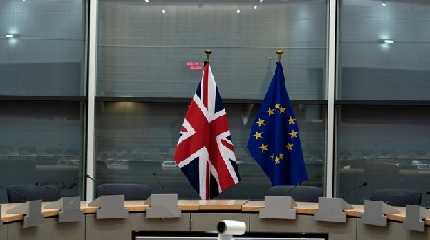
LONDON, Feb 9 (Reuters) - Britain wants to see enough progress in talks with the European Union over the Northern Irish protocol in the next 10 days to demonstrate to unionists in the province that things are moving in the right direction after they pulled out of government.
Northern Ireland's first minister Paul Givan last week resigned in protest at the post-Brexit trade rules, potentially complicating talks between the EU and Britain to rework a politically divisive protocol that was agreed by London as part of its exit from the EU.
The move paralysed decision making in the province, which is set for elections on May 5. Givan's Democratic Unionist Party (DUP) have indicated that without progress on the protocol, they will not rejoin power-sharing arrangements in Northern Ireland's assembly.
Britain is hoping for progress in talks with the EU by Feb. 21.
"If we can make a good step forward... to show there is a process that's moving in the right direction, that would clearly be a positive thing," a senior British government source said on condition of anonymity.
"We're not necessarily expecting to resolve everything in the next 10 days, obviously. This is probably going to be more of a process but that process needs to show unionism that it's significant and actually moving in the right direction to resolve outstanding issues."
The protocol kept Northern Ireland in the EU's single market for goods in order to preserve a politically sensitive open border with EU member state Ireland.
In so doing, though, it created an effective border in the Irish Sea, angering pro-British, pro-Brexit unionists in the province and spurring the British government to seek to rewrite the deal it signed up to.
Earlier on Wednesday, British Prime Minister Boris Johnson said that London would take action to suspend post-Brexit customs checks on some goods moving to Northern Ireland if the bloc did not show "common sense".
"We're hopeful that in the next couple of weeks, we can get a big enough move from the EU, and they will truly recognise the urgency and significance of the situation, but clearly there are no guarantees," the senior British government source said.
"There's pressure on to get this resolved before going to the pre-election period at the end of March."




